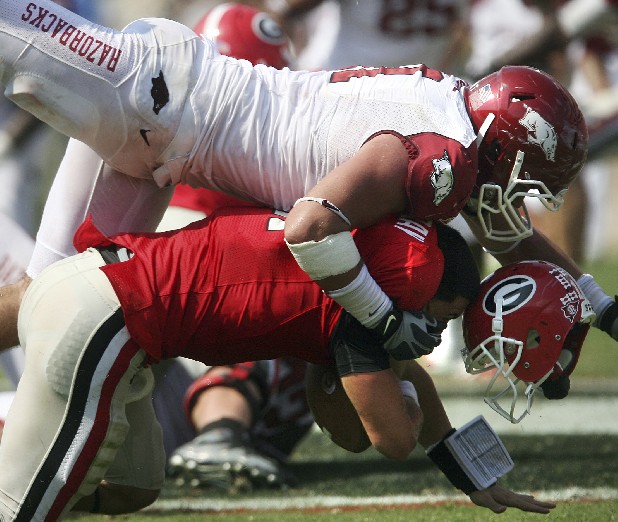New NCAA rule draws mixed reactions
Friday, January 1, 1904
BY THE RULESThe NCAA has adopted several rule changes for the upcoming college football season:• A player flagged for targeting, which is when a player hits a defenseless player above the shoulders, will also be ejected from the game.• Teams with no time outs can only spike the ball when there are three or more seconds left in the half or the game. If there are one or two seconds left, the quarterback has to run a play.• If a player is injured in the final minute of the half or game and that is the only reason for stopping the clock, there will be a 10-second runoff potential.• Last year, a player had to go out of the game if his helmet came off. Now, if a team has a time out, it can use the time out to keep the player in the game.
For Georgia quarterback Aaron Murray, the only thing worse than throwing an interception is getting clobbered during the interception return.
Murray experienced that undesired scenario in last December's Southeastern Conference championship game against Alabama, when he was intercepted late in the second quarter by Crimson Tide safety HaHa Clinton-Dix. While Clinton-Dix was heading back upfield, an unsuspecting Murray was leveled by a helmet-to-helmet tackle by 6-foot-6, 304-pound Tide defensive lineman Quinton Dial.
"You're taught at a young age that if a quarterback throws a pick, that's the first guy you go after," Murray said Thursday at the league's media days in Hoover, Ala. "It's nerve-racking every time you throw an interception, because your head has to be on a swivel. It's every defender's job to go after you, and they don't care if you're 20 yards, 30 yards or 50 yards away from the ball.
"It's stressful, and I don't think that's what the game was meant for. You're not trying to kill someone."
Officials did not throw a flag on Dial, and SEC coordinator of officials Steve Shaw quickly admitted the call was missed.
Quarterbacks who throw interceptions this year will be deemed defenseless as part of the NCAA's strengthening stance on targeting, which is when a player hits a defenseless player above the shoulders. The quarterback can still be blocked during a return, but any hit above the shoulders on a quarterback will result in that defender not only being flagged but ejected.
"I worked 15 years as a referee in the SEC, before that six years in the Gulf South, and this is my third year as coordinator of officials," Shaw said, "so I've had a long time of dealing with officiating in the NCAA. This rule change is probably the most significant rule change in my tenure ever. It has an impact on our game and is very, very important."
Until this season, defenseless players had included quarterbacks during their passing motion, kickers and punters during their kicking motion, receivers coming over the middle and players completely out of the play. In addition to quarterbacks being defenseless after throwing interceptions, the kickers will be defenseless for the remainder of the down, and any player receiving a blindside block will be as well.
Blindside blocks are common on punt and kickoff returns.
Murray said that he can speak for all quarterbacks in that he's very happy for the new targeting rules. Defenders aren't sharing in the joy.
"I don't really like that rule," South Carolina defensive lineman Jadeveon Clowney said. "I am 6-6, and the guys I go against are 6-3 or 6-foot. It's going to be hard for me to get low and not hit them above the shoulders. It's football."
Vanderbilt cornerback Andre Hal was flagged for a helmet-to-helmet personal foul in the fourth quarter of last season's 17-13 opening loss to South Carolina. His hit sent former South Carolina tight end Justice Cunningham and his helmet flying, but Cunningham held on to the ball for a 21-yard gain, and the accompanying penalty set up the go-ahead score for the Gamecocks.
Hal has spent the past several months working on tackling lower and not getting near the head of an opponent.
"It's probably going to be in the back of everybody's mind," Hal said. "It's hard to focus on what you're hitting, because on defense you're just trying to get the man down. You're going to have to slow down and tackle the man low, and it's going to be hard to do that.
"It kind of goes against instincts, but I've got to work on it, because I don't want to get suspended for a game."
Under the stricter guidelines, a player penalized for targeting in the first half will miss the remainder of the game. If the infraction occurs in the second half, the player will miss the rest of that game and the first half of his next game.
Instant replay will be used to review every targeting foul, according to Shaw, and if the replay shows no contact above the shoulders, a player can be reinstated in the game.
"Playing time is a motivator to our players, and we think this will have a pretty significant impact," Shaw said. "The rules committee really believes this will make an impact."
Contact David Paschall at dpaschall@timesfreepress.com or 423-757-6524.

